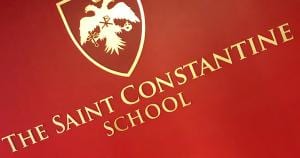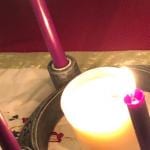 The just live by faith.
The just live by faith.
This is the Orthodox, classical, Christian school: faithful to what she believes so that not even a threat of death can make her lie about reality, yet loving to even our intellectual enemies. We know our failings, so our schools humble ourselves to theological wisdom, scientific truths, and to the Divine Logos who governs the cosmos.
This life of faith is not living against our reason or experience, rather living by best reason and our experience. In the context of a community, where our arguments, passions and explanations are open to criticism or affirmation, comes the acquisition of a reasonable hope. Some few of us, great saints, may see so much that the experience becomes indubitable. For the rest of us, we walk by faith, not by sure sight, in our substantial hope in God.
We wonder, because of the gap between our knowledge and the possibilities of our error. However, we also wonder because most answers lead to better questions. In science, when an idea is established in the community, gaining the force of a “theory of science,” science does not end! New questions spring from the theory and science advances, building on the theory often leading to new theories.
The dialectic after Hegel too often is reduced to one idea supplanting another. If understood this way, the dialectic becomes the enemy of all education, especially classical education. Partisans of particular ideas will battle to supplant the “others” and the result will be confusion in many students. Worse will be when one ideology “wins,” often with the force of government and social sanctions, and forces a straight jacket on wonder.
This muzzling takes place in some “religious” and “secular” schools where a preexisting ideology is viewed as so triumphant and any criticism so wrongheaded that criticism is no longer allowed. There is no respect shown to those who dissent from the consensus and true dialog dies.
The classical Christian school must not go this way. This is not because we are wobbly or unsure that we are classical, Christian, or Orthodox. We do this, because we are classical, Christian, and Orthodox. The courage of our convictions allows us to examine all things knowing the truth (eventually) will strengthen error.
A caution is in order. Students must be allowed to wonder about what they are considering, not about what some skeptic online is touting nor about whatever issues the teacher is having. A truly dialectic class will not create false questions by prodding the student into asking what fits the script of the mentor or teacher. Every student is unique and has his own set of questions. The ideologue cannot be patient with the student, rushing them to the questions they should have.
What of the student in dogmatic slumber?
We might prod such a student, asking what they think, why they think it, and the implications. We should not, however, try to force curiosity. Instead, we can do all we can through different types of activities to wake up the student. Nature often helps. Our garden, trees, and natural playground, stimulate wonder. They are designed to do so. Our college students sit in classrooms full of icons, artifacts, books, and other objects strategically placed. Beauty may not always save us, but it surely can invoke wonder if our souls are still alive!
And yet merely asking questions is not a dialog. Questions can be used to manipulate as well as educate.
There is the false dialectician in some of our discussions who hears the spirit of our age, looks at the creeds (the established theories of theology) and cries for dialog. This is always a false dialog, since it will only continue until the proper conclusion, one that agrees with the secular consensus, is reached. This sophistry has seduced many: bishops, false councils, professors.
We discuss in sincerity and not under external pressure.
God save the Church from heresy, particularly the heresy of false dialog.
Against this false dialog is the genuine wonder of one who moves on from the truth and develops new ideas based on that truth. Orthodoxy is not vain repetition of creeds in classrooms, but living application of the truth to new situations. This application will not contradict what has come beforehand, but will build on that truth or (more daringly) subsume that truth in a larger, consistent vision.
That is how philosophy, science, and theology should be taught in the classical Christian school. Love of the good, true, and beautiful, the constant motive.












